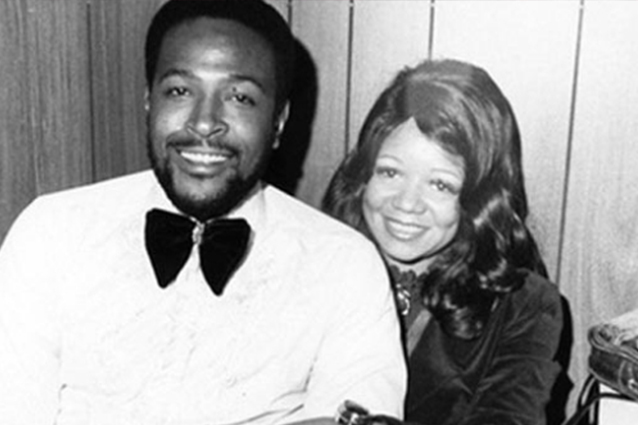Reading Time: 7 minutes
I have a thing for sad love songs.
There, I said it.
Sad love songs tend to provide insight into the nature of the human condition in ways that nothing else does.
One of the saddest love songs ever written, in my opinion, is When Did You Stop Loving Me, When Did I Stop Loving You? by Marvin Gaye (1939-1984). The song is included on Gaye’s 1979 album Here, My Dear.
Gaye recorded Here, My Dear in order to comply with the financial conditions of a notoriously contentious divorce settlement with his first wife Anna Gordy Gaye (1922-2014), in which she demanded one million dollars from the financially-strapped singer.
Astonishingly transparent in its lyricism, When Did You is a brutally honest, no-holds-barred account—from Marvin Gaye’s perspective—of the death of a passionate yet caustic and vitriolic marriage in which emotional love was not enough.
The song opens with the voice of a somewhat pensive and ruminative Gaye speaking these words (presumably to Anna):
“You know, when you say your marriage vows, they’re supposed to be for real. I mean, if you think back about what you really said about honor, loving, and obeying till death do us part and all. But it shouldn’t be that way, it should, it should, it shouldn’t be lies because if it turns out to be lies, if you don’t honor what you said, you lie to God and the words should be changed.”
In a November 2013 article for Psychology Today entitled 3 Reasons Why You Shouldn’t Marry for Love Alone, author and therapist Susan Pease Gadoua said that:
“Love is a changeable emotion. As quickly as you fall in love, you can fall out of love. Then what? Either the relationship ends or it becomes toxic. If love is your primary connection, the glue is gone.”
For what it’s worth, I happen to concur with Gadoua.
“You say you love me with all your heart. But if you ever loved me with all of your heart, you’d never take a million dollars to part.” — Marvin Gaye, When Did You Stop Loving Me, When Did I Stop Loving You
If emotional love is your primary motive or impetus for getting or staying married, eventually you will learn that it is insufficient in and of itself to hold your marriage together. That is because, as fallen human beings (Romans 3:23), the love we have for our spouse—regardless of how deep or genuine it might be—is inherently deficient, imperfect, and mutable.
Conventional wisdom would argue that marrying for love is one of the highest of all human virtues—perhaps the highest. For example, an All Women’s Talk article from 2011 lists seven reasons why people should marry for love alone. And yet it is our innate inability as fallen human beings to love one another perfectly that gives rise to such acrid and lugubrious relationships as was Marvin and Anna Gaye’s.
“All I ever really wanted was to love you and treat you right, but all we did was fuss and fight.” — Marvin Gaye, When Did You Stop Loving Me, When Did I Stop Loving You
The truth is, many husbands and wives view love through the subjective paradigm of their own emotions and how they may or may not feel about their spouse at any given point in time. Sadly, however, that prevailing notion of love—that it is primarily a matter of emotions—is largely why marriage is so romanticized in our culture today. As theologian Douglas Wilson writes in his book Reforming Marriage,
“Romantic love, as it is commonly understood, is a modern idol of the mind, emotions, and heart. Because many husbands and wives serve this idol, it is not surprising that it causes great dissatisfaction within marriages, hopeless expectations, quarrels, fights, and, of course, divorces. Idolatry occurs whenever we look to a created thing with the expectation that it be and do what only the living God can be and do.”
It is a wonderful thing for a husband and wife to feel a certain depth of emotional love toward one another. After all, not all spouses do, which begs the questions: What is love anyway? And what does, or should, marital or covenant love actually look like? The seventeenth-century Puritan, Richard Steele (1629-1692), answers those questions in his book The Duties of Husbands and Wives:
“Loving each other is both the husband’s (Colossians 3:19) and the wife’s duty (Titus 2:4). Love is the great reason and comfort of marriage. This love is not merely romance, but genuine and constant affection and care for each other “fervently with a pure heart” (1 Peter 1:22). Marital love cannot be based on beauty or wealth, for these are passing, and not even on piety, for that may decay. It must be based upon God’s command which never changes. The marriage vow obliges “for better or for worse,” and married persons ought to consider their own spouses the best in the world for them. Marital love must be durable, lasting even after death has severed the bond (Proverbs 31:11-12). This true-hearted love brings true content and comfort in its train. It guards against adultery and jealousy. It prevents or lessens family trouble. Without it, the marriage is like a bone out of joint. There is pain until it is restored.”
Notwithstanding the lamentable outcome of his marriage, Marvin Gaye was correct in this one respect: marriage vows should be “for real.” But the reality is that marriage vows are only as good as the intent on the part of the individual reciting those vows to honor them. After all, of what worth or value is any vow, marriage or otherwise, apart from a heart wherein dwells the conviction to abide by it (Psalm 15:4)?
As finite human beings, you and I can truly know each other only in terms of hindsight—how we treat one another through empirical experience. We can never know each other from the standpoint of foresight—the intent or motive behind our treatment of one another, for intent is something that only God can know (Jeremiah 17:10a; Acts 15:8a).
“The most ultimate thing we can say about marriage is that it exists for God’s glory. That is, it exists to display God. Now we see how: marriage is patterned after Christ’s covenant relationship to the church. And therefore the highest meaning and the most ultimate purpose of marriage is to put the covenant relationship of Christ and his church on display. That is why marriage exists. If you are married, that is why you are married.” — John Piper
My wife, Melissa, has often said that, in her opinion, the primary threat to most marriages is unrealistic expectations husbands and wives place on one another. I agree wholeheartedly. In fact, it is in that kind of relationship that couples tend to grade the state of their marital health on a curve, depending on the degree to which one spouse meets or exceeds the subjective and often tendentious demands of the other.
But such is the marriage that is self-centered rather than God-centered.
“Although we tried, all of our promises were nothing but lies.” — Marvin Gaye, When Did You Stop Loving Me, When Did I Stop Loving You
What I want most for readers of this blog post to understand is that marriage is a supernatural institution.
What makes marriage supernatural is that marriage is God’s idea (Genesis 2:22-24). And because marriage is God’s idea, husbands and wives need God’s divine wisdom to understand both what marriage is and the purposes for which God has ordained it (Ephesians 5:22-33; 1 Peter 3:1-12). But not only is marriage supernatural, but it is also eschatological in that it ultimately points us to the culmination of the indissoluble covenantal union between Christ and His Bride, the Church (Revelation 19:7).
“Staying married is not about staying in love. It is about keeping covenant.” — John Piper
The love that God demands of husbands and wives is a love that goes far beyond mere emotions and feelings. It is a love that willingly takes up its cross and carries it—as Jesus did—even unto death (Philippians 2:8). That kind of selfless and sacrificial love is beyond the capability of any man or woman to express in and of himself or herself.
That is why it is so dangerous to enter into a marriage on the basis of feelings alone. Spending your life with another fallen human being will require more than emotional love to endure the transgressions your spouse will most certainly commit against you; it will take the kind of divine grace that is available only through faith in Jesus Christ. As pastor and author Dave Harvey writes in When Sinners Say ‘I Do’,
“Without a clear awareness of sin, we will evaluate our conflicts outside of the biblical story—the finished work of Jesus Christ on the cross—thus eliminating any basis for true understanding, true reconciliation, or true change. Without the gospel of our crucified and risen Savior our marriages slide toward the superficial. We begin to make limp justifications for our sinful behavior, and our marriage conflicts end, at best, in uneasy, partial, negotiated settlements.”
Consider also these words from the great Welsh theologian D. Martyn Lloyd-Jones, who declares in Christian Marriage that,
“If a husband and a wife are together considering Jesus, you need have no worry about their relationship to each other. Our human relationships and affections and loves are cemented by our common love to Him. If both are living to Him and His glory and His praise, if both have got uppermost in their minds the analogy of Christ and the church, and what He has done for the church that she might be redeemed and that they, as individuals, might become the children of God—if they are overwhelmed by that thought and governed by it, there will be no danger of their personal relationship meeting with disaster.”
Sadly, Marvin and Anna Gaye discovered too late that passionate feelings and emotions go only so far. For, in reality, theirs was one of the most bitter, vindictive, and injurious relationships I’ve ever studied.
“I had to leave you for my health’s sake.” — Marvin Gaye, When Did You Stop Loving Me, When Did I Stop Loving You
I want to reiterate that there is a place for amatory emotions and feelings in marriage. That much should go without saying. But when your visage of marriage is built upon and sustained by the sentiments of changeable and mercurial sinners—which we all are—the demise of your marriage is merely a matter of time (as the Gaye’s eventually learned).
When Did You is an incredibly sad song that serves as a lyrical testament to an equally sad marriage that belies the imagery depicted in the photo at the top of this blog post. But Marvin and Anna Gaye are only one example of what can happen when a marriage is built on anything other than Jesus Christ and His gospel.
All other ground is sinking sand.
Humbly in Christ,
Darrell
Image credit.
Related:
Staying Married Is Not About Staying In Love — John Piper
Marriage As It Was Meant To Be — John MacArthur


Trackbacks/Pingbacks